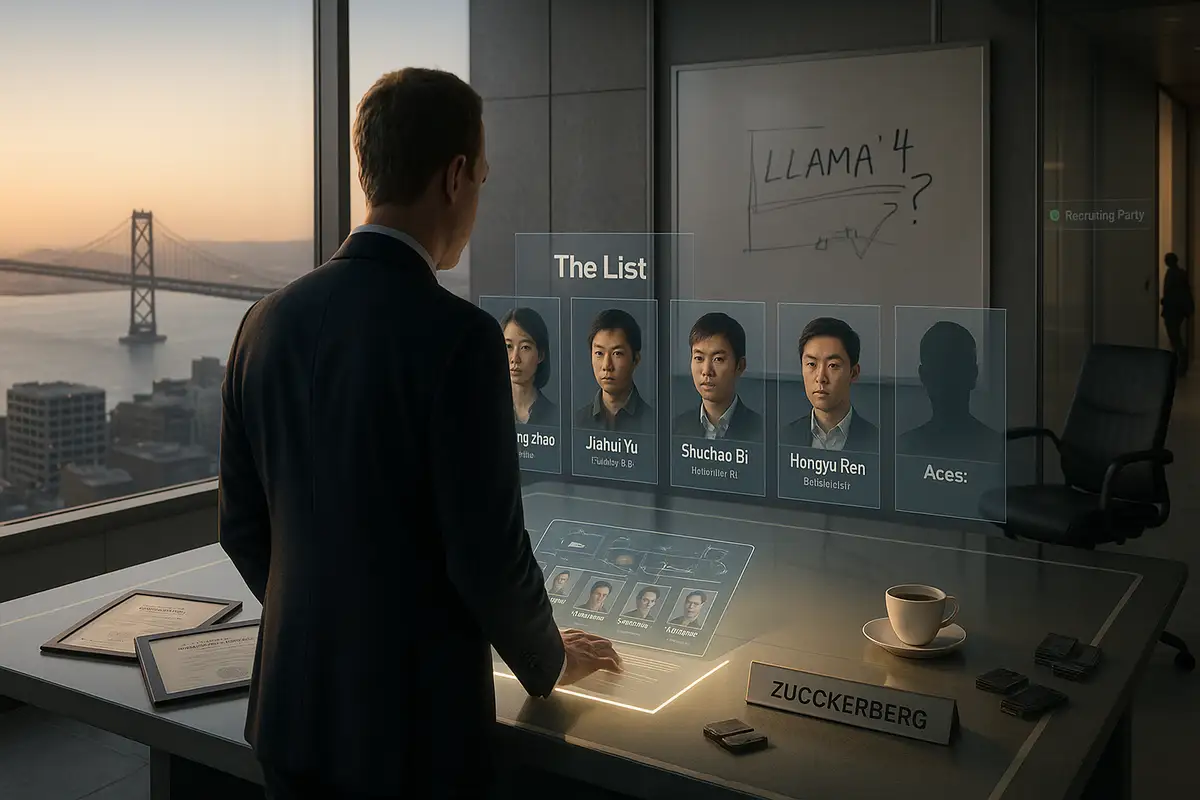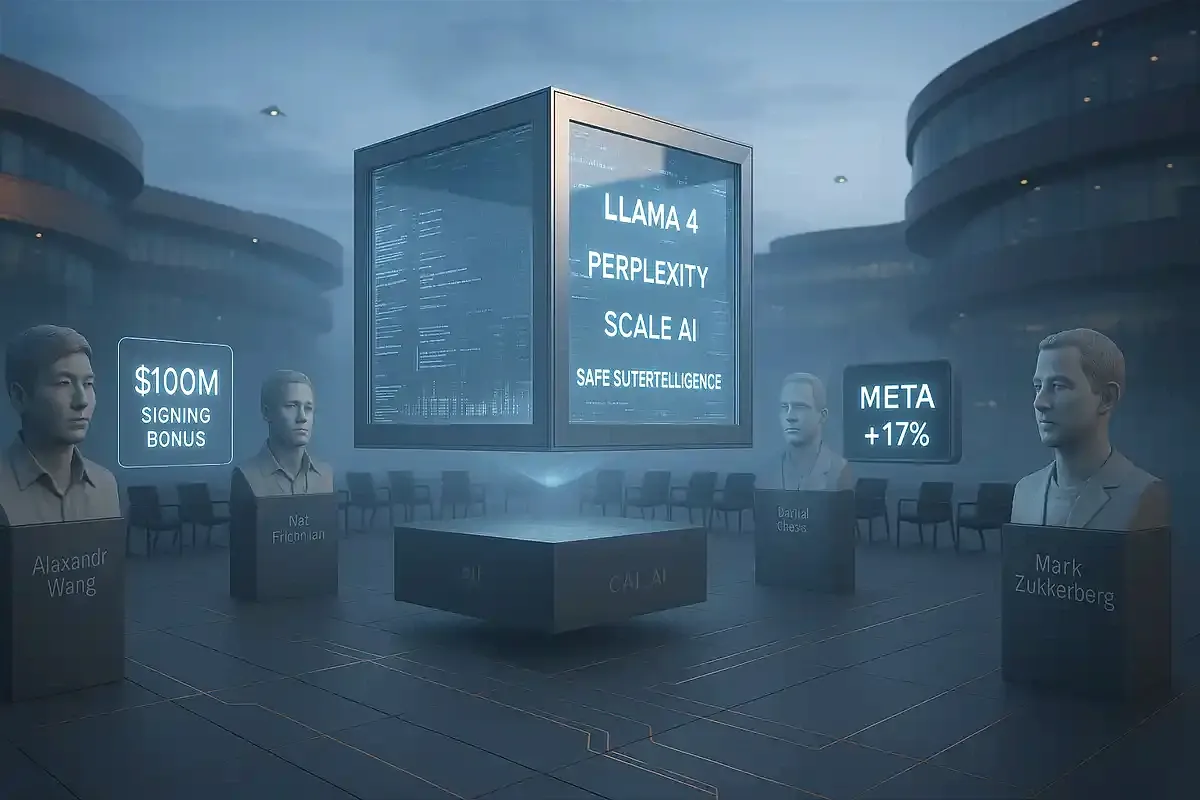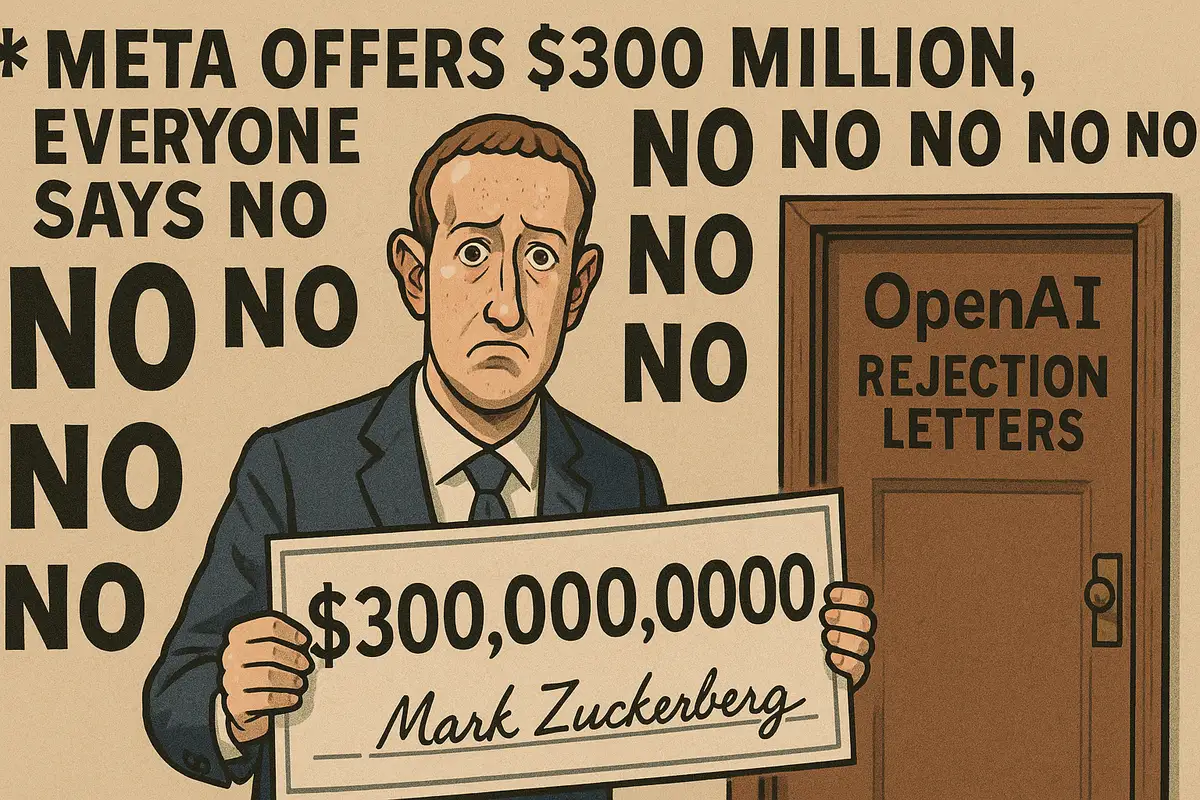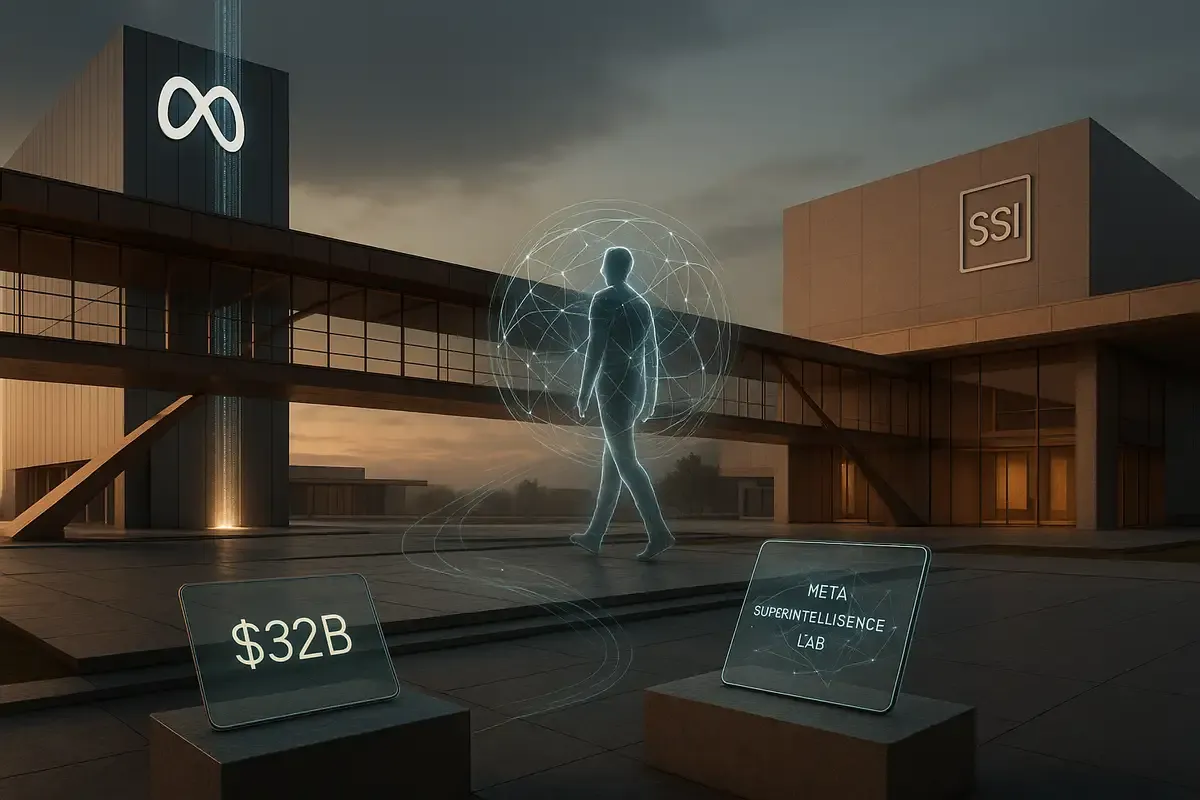💡 TL;DR - The 30 Seconds Version
👉 Daniel Gross left Safe Superintelligence on June 29 to join Meta after the social media company failed to acquire the $32 billion AI startup.
💰 Meta tried to buy Safe Superintelligence outright but founder Ilya Sutskever refused, forcing Meta to hire key talent instead.
🤝 Meta is also buying up to 49% of NFDG, the venture fund Gross co-founded, giving Meta indirect exposure to AI startups.
🏭 This feeds into Meta's new Superintelligence Labs initiative, which includes a $14.3 billion investment in Scale AI and its CEO.
🌍 The move reflects the broader AI talent war, with companies offering $100+ million packages to recruit top researchers and executives.
🚀 Sutskever now runs Safe Superintelligence as CEO and insists the company will remain independent despite acquisition attempts.
Daniel Gross spent exactly one year building Safe Superintelligence into a $32 billion AI startup. On June 29, he walked away from it all to join Meta.
The departure marks another victory for Mark Zuckerberg's aggressive push to dominate the race for artificial general intelligence. Meta tried to buy Safe Superintelligence outright but got turned down. So they did the next best thing: they hired its CEO.
Ilya Sutskever, the former OpenAI chief scientist who co-founded Safe Superintelligence with Gross, announced the leadership change Thursday. He's now running the company as CEO while Daniel Levy steps up as president. Sutskever thanked Gross for his early work but made one thing clear: the company isn't for sale.
The Acquisition That Wasn't
Meta's interest in Safe Superintelligence started as something bigger than a hiring raid. Reports emerged in mid-June that Zuckerberg wanted to buy the entire company. The startup, which raised $1 billion last year to build AI systems that safely exceed human intelligence, seemed like a perfect fit for Meta's new superintelligence lab.
But Sutskever had other plans. He rebuffed the takeover offer, leaving Meta to pursue plan B: cherry-pick the talent instead. The strategy worked. Gross joined Meta's newly formed Superintelligence Labs, where he'll work on AI products alongside other high-profile recruits.
The rejection didn't stop Meta from addressing acquisition rumors head-on. "You might have heard rumors of companies looking to acquire us," Sutskever wrote on X. "We are flattered by their attention but are focused on seeing our work through."
The NFDG Connection
Gross didn't come to Meta alone. His longtime business partner, Nat Friedman, joined him. The two ran NFDG, a venture capital firm that invested in companies like Safe Superintelligence, ElevenLabs, and Perplexity. Now Meta wants a piece of that action too.
The company offered to buy up to 49% of NFDG's holdings through a tender offer to limited partners. It's an unusual move that gives Meta indirect exposure to the fund's portfolio without direct control or information rights. Limited partners can cash out at current net asset value - a rare opportunity in today's market where secondary transactions usually come at a discount.
The arrangement solves a potential conflict of interest. NFDG's portfolio companies don't have to worry about sharing sensitive information with Meta, since the social media company won't have governance rights or appear on cap tables. It's a clean way for Meta to gain exposure to the AI startup ecosystem while avoiding regulatory or competitive concerns.
NFDG won't make new investments. The existing portfolio will be managed by the remaining team, with advice from John Collison of Stripe and Matt Huang of Paradigm. The firm was raising $1.5 billion for a second fund, but those plans are now scrapped.
Meta's Superintelligence Push
The Gross hire fits into Zuckerberg's broader strategy to reorganize Meta around AI. The company created Meta Superintelligence Labs this week, bringing together researchers and engineers under one roof. The unit will lead AI research, develop Meta's Llama language models, and handle commercialization.
Alexandr Wang, the former CEO of Scale AI, now serves as Meta's chief AI officer. Meta invested $14.3 billion in Scale earlier this year, bringing Wang and several key engineers into the fold. The investment gives Meta access to Scale's data labeling and AI training infrastructure - crucial resources for building advanced AI systems.
The hiring spree extends beyond executive ranks. Meta has recruited researchers from OpenAI, Google DeepMind, and Anthropic. Reports suggest the company is offering AI researchers upwards of $100 million to join. It's an expensive strategy, but one that reflects the stakes involved.
Zuckerberg described superintelligent AI as the beginning of "a new era for humanity" in a memo to employees. He pledged to invest whatever it takes for Meta to lead the field. The company has also held discussions about acquiring AI voice startup PlayAI and reportedly approached Perplexity about a potential deal.
What This Means for Safe Superintelligence
Gross's departure raises questions about Safe Superintelligence's future. The company bills itself as the world's "first straight-shot SSI lab" - meaning it has no other products or business lines. It's focused entirely on building safe superintelligent AI, a goal that could take years or decades to achieve.
The timing of Gross's exit is notable. If Safe Superintelligence was close to a breakthrough, why would a co-founder leave to join a larger company with competing priorities? The move suggests either the research timeline is longer than expected, or Gross saw better opportunities at Meta.
Sutskever seems confident about the company's direction. He emphasized that Safe Superintelligence has the compute resources, team, and technical knowledge to continue its work. The company raised $1 billion last year and achieved a $32 billion valuation in April, giving it significant runway.
The leadership change also puts Sutskever fully in charge of both technical and business operations. He previously served as OpenAI's chief scientist and co-led the company's Superalignment team. His experience with AI safety research makes him well-suited to lead Safe Superintelligence's mission.
The Broader Talent War
The Safe Superintelligence situation illustrates the fierce competition for AI talent across Silicon Valley. Companies are offering massive compensation packages, equity grants, and leadership roles to attract top researchers and executives. The stakes are high enough that even a $32 billion valuation doesn't guarantee talent retention.
Meta's approach has been particularly aggressive. The company has made multiple acquisitions and investment deals specifically to acquire talent. The Scale AI investment brought Wang and his team. The NFDG stake gives Meta exposure to promising startups. Individual hires like Gross and Friedman add proven leadership.
Other companies are responding with their own hiring pushes. OpenAI, Google, Amazon, and Microsoft are all competing for the same pool of talent. The result is escalating compensation and increasingly complex deal structures designed to attract and retain key personnel.
Why this matters:
- The AI talent war is reshaping Silicon Valley's power dynamics, with companies using acquisitions and massive compensation packages to build competitive advantages rather than just developing technology internally.
- Meta's failed attempt to buy Safe Superintelligence shows that even $32 billion valuations aren't enough to guarantee acquisitions when founders prioritize independence over exit opportunities.
❓ Frequently Asked Questions
Q: What exactly does Safe Superintelligence build?
A: Safe Superintelligence focuses solely on creating AI systems that can safely exceed human intelligence across many tasks. Unlike other AI companies with multiple products, SSI has one goal: building superintelligent AI with built-in safety measures. The company raised $1 billion in 2024 and reached a $32 billion valuation without releasing any commercial products.
Q: Why did Meta's acquisition attempt fail?
A: Ilya Sutskever, SSI's co-founder and former OpenAI chief scientist, rejected Meta's buyout offer because he wanted to keep the company independent. Sutskever believes SSI's mission of building safe superintelligence requires focus that might be compromised within a larger corporation with competing priorities and existing product lines.
Q: How much are companies paying to recruit AI talent?
A: Meta is reportedly offering AI researchers over $100 million to join its superintelligence lab. The company also invested $14.3 billion in Scale AI partly to acquire CEO Alexandr Wang and key engineers. These packages include equity grants, salaries, and leadership roles in new AI divisions.
Q: What is NFDG and why does Meta want it?
A: NFDG is a venture capital firm co-founded by Daniel Gross and Nat Friedman that invested in AI startups like Safe Superintelligence, ElevenLabs, and Perplexity. Meta is buying up to 49% of NFDG's holdings to gain exposure to promising AI companies without direct control or governance rights.
Q: Who is Ilya Sutskever?
A: Sutskever co-founded OpenAI in 2015 and served as its chief scientist until 2024. He led OpenAI's Superalignment team focused on AI safety and played a role in Sam Altman's brief ouster. He left OpenAI to start Safe Superintelligence with Daniel Gross and Daniel Levy in 2024.
Q: What will Meta's Superintelligence Labs actually do?
A: Meta Superintelligence Labs will lead the company's AI research, develop Meta's Llama language models, and handle commercialization of AI products. The unit combines researchers from OpenAI, Google DeepMind, and other companies under CEO Alexandr Wang and co-leader Nat Friedman.
Q: How does this affect other AI companies?
A: The talent war is escalating across Silicon Valley, with OpenAI, Google, Amazon, and Microsoft all competing for the same researchers and executives. Companies are using acquisitions, massive compensation packages, and equity deals to build competitive advantages rather than just developing technology internally.
Q: When did all this happen?
A: Daniel Gross officially left Safe Superintelligence on June 29, 2025. Meta's acquisition attempt was reported in mid-June. The company announced its Superintelligence Labs reorganization this week, with Sutskever confirming Gross's departure on July 3, 2025.
















